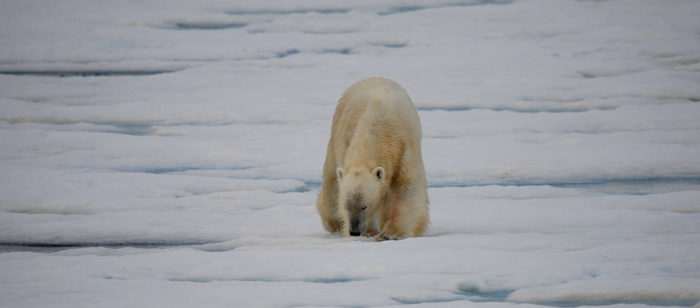Tragic news emerged from Svalbard today as a man died in hospital following an attack by a polar bear. The attack happened at a campsite close to the airport, a short distance away from the main town of Longyearbyen where roughly 2000 people live.
Despite frequent polar bear sightings and the estimated number of polar bears in and around Norway’s Svalbard archipelago largely outnumbering humans, an incident like this has not happened since 2011 when a teenage boy died after a polar bear attack. The attack now in the early hours of Friday August 28th marks the 5th death of a person from a polar bear attack in Svalbard since 1971. Other people at the campsite were physically unharmed and the polar bear which was shot at, was later found dead in the airport’s parking lot.
As polar bear sighings are frequent in Svalbard and polar bears are recognised as a danger to humans, it is a mandatory precaution for all to carry firearms outside the towns and settlement. Primarily as means to fire warning shots if needed as permission to shoot polar bears is only allowed in life-threatening situations.
“With drastically diminishing sea-ice, polar bears face serious challenges in obtaining food – but humans are far from the top of their wish-list”
The Svalbard archipelago, lies between Norway and the North Pole, within the Arctic Circle and is under Norwegian sovereignty. Described as a wilderness of glaciers, rugged, remote terrain and frozen tundra, it is home to the world’s northernmost inhabited areas; the Norwegian main town of Longyearbyen, the small Russian mining town of Barentsburg and the small, but permanently habited international research community and research station of Ny-Ålesund.
Climate change has caused drastic loss of sea-ice in recent years and that has lessened access for polar bear to seals as their main food source and caused increased polar bear activity on land.
Scientist and polar bear researcher Jon Aars at the Norwegian Polar Institute is quoted by the Norwegian broadcaster NRK saying that desperation for food was a likely reason for the tragic encounter at the campsite. “At this time of year, polar bears face big challenges in obtaining food. It has been a long time since there has been ice in the main hunting area, so there is less access to seals. Therefore polar bears spend more time on land to find alternative food – but,” he adds, “although humans can be prey, they are far from the top of the polar bear wish list.”
Photograph JONAA©Kristjan Fridriksson
Further reading on polar bears and on Svalbard in JONAA, Journal of the North Atlantic & Arctic:
Polar Bear – or is it Aqua Bear?
Polar Bears, Pollutants and Sea Ice Decline
Science at the End of the Earth

